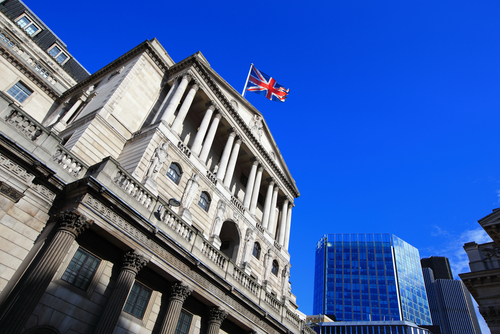
Europe | Monetary Policy & Inflation | Politics & Geopolitics

Europe | Monetary Policy & Inflation | Politics & Geopolitics
This article is only available to Macro Hive subscribers. Sign-up to receive world-class macro analysis with a daily curated newsletter, podcast, original content from award-winning researchers, cross market strategy, equity insights, trade ideas, crypto flow frameworks, academic paper summaries, explanation and analysis of market-moving events, community investor chat room, and more.
The Bank of England (BoE) meets on Thursday to decide interest rates. It must balance a declining growth outlook and a significant overshoot of near-term, energy-driven inflation. The issue is that while they face into a strong near-term inflation spike, their forecasts predict economic downturn and an inflation undershoot further out (when monetary policy will have most effect).
However, the government’s energy price freeze makes the tightrope a little easier to walk. By our calculations, it will shave off around 3 percentage points from inflation in the near-term (through the price cap), and lift it towards target out to 2024 (by preventing the consumer crunch we had otherwise predicted, Chart 1).
Some argue that, as the spending amounts to a huge fiscal stimulus, it will cause medium-term inflation to overshoot the target. This risk will be clearer come Friday, when the chancellor announces further details. Yet for now, we expect this medium-term effect to be limited.
First, the price cap is tied to energy usage, so it will be relatively regressive, which should mean a higher proportion is saved than the £15bn injection provided in May. Similarly, proposed tax cuts are unlikely to produce a surge in spending, particularly when (again) they are regressive (NI cut) or benefit businesses. Additionally, the new prime minister may seek to cut spending elsewhere (including public sector employment) to balance the situation, which will further soften the inflation effect in the medium term.

For now, with the labour market still very tight, and inflation remaining high, there is good reason to expect the BoE will repeat a 50bp hike.
On this basis, we expect the BoE will hike by 50bp at this week’s meeting, which would be an under-delivery versus current market pricing of 70bp (Chart 2). Further out, there is even more room for an under delivery (Chart 3). We expect that come November’s Monetary Policy Review, the dovish pivot should be clear.

The market is pricing the BoE to do about 150bp of hiking between the August and November meetings, when it updates its forecasts, and a 4.5% peak in the policy rate. However, with the effect of fiscal policy on inflation (as in Chart 1), this seems unrealistically high. Note, our assumption on inflation assumes no recession, nor includes the impact of significantly higher market rates (which the BoE baseline forecasts will need to). As such, come November the BoE’s forecast for inflation could be even lower.
The macro forecasts now point to fewer additional hikes. The next domino to fall will be inflation expectations. This is the mast to which hawks such as Mann have pinned their flags. The effect of the energy price cap has not yet fed into surveys. The first survey it will hit will likely be the September Decision Maker Panel Survey (due early October). Even so the medium-term fears of recession are beginning to weigh on consumers. The August Inflation Attitudes Survey is already showing moderation – with its first decline since Q2 2021 (Chart 4).

Meanwhile, the UK economy is facing continued headwinds. Global growth is slowing, and Europe’s energy crisis is far from over. The catastrophic consumer crunch that would have occurred had the government not frozen energy prices has been averted, but that does not mean the consumer situation is fine. Even if YoY wage growth stay elevated at 5.5% (unlikely given falling job vacancies and slowing economic growth) real wates will remain negative until mid-2023. Meanwhile, this week’s bank holiday for the queen’s funeral will have taken a further bite out of Q3 output.
Spring sale - Prime Membership only £3 for 3 months! Get trade ideas and macro insights now
Your subscription has been successfully canceled.
Discount Applied - Your subscription has now updated with Coupon and from next payment Discount will be applied.